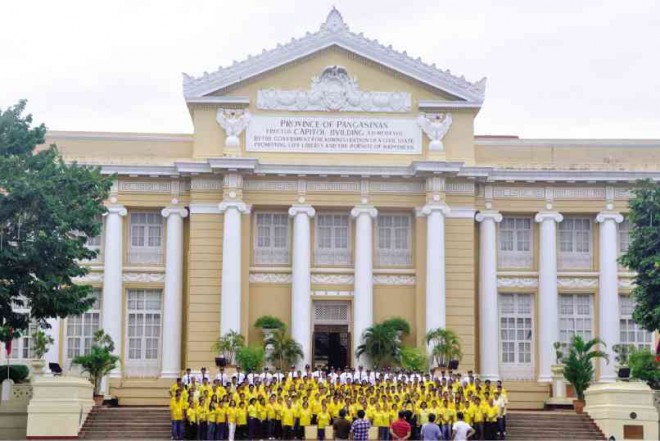Soon, a center on Pangasinan history, people and culture
Anyone wanting a good glimpse of Pangasinan’s history, people and culture will soon have a single place to go with the
establishment this year of the Pangasinan Studies Center (PSC).
Prospero de Vera, University of the Philippines (UP) vice president for public affairs, says those behind the center have prepared a preliminary paper on its functions but are waiting for local schools to agree to enter into a consortium.
The establishment of the PSC was an offshoot of a memorandum of understanding (MOU) signed in June between UP president Alfredo Pascual and Gov. Amado Espino Jr.
The MOU, among other things, tapped UP experts, particularly those who trace their roots to Pangasinan, to help preserve and promote the province’s language and culture.
De Vera says an option is for the center to be established at the Pangasinan State University (PSU). But other schools also want to host the center in their own campuses.
“So, we might just establish the center right at the provincial capitol complex and get private and state universities here to enter into a consortium. UP will provide technical assistance,” says De Vera.
The need for a studies center had been proposed as early as 2000 when local literary writers and historians banded themselves into the Ulupan na Pansiansiay Salitan Pangasinan (Organization for the Preservation of Pangasinan Language). Historian Erwin Fernandez, former Ulupan president, says the province needs a center to put Pangasinan history, identity and culture on the academic map.
“From there, the center can embark through programs and projects on popularizing the identity, history and culture of its people in mainstream media, correcting misconceptions and labels, and encouraging its own people to value their identity and culture,” he says in an e-mail to the Inquirer.
“It is imperative and timely to establish this center since Pangasinan is almost always absent in popular consciousness and knowledge because this is lumped with other ethnic groups,” he says.
Pampanga model
Ulupan led the creation of a studies center in the early 2000s and signed an MOU with a private university in Dagupan City. “But it was only good on paper. Nothing came out of it. It is a pity, unlike the Center for Kapampangan Studies [in Pampanga], which is really the model for this idea,” Fernandez says.
He says the owners of Holy Angel University (HAU) in Angeles City, who are Kapampangan, funded, developed and built the center in their university, coming up with a museum as well as magazines and journals.
“The Kapampangan elite supported its activities. It only takes a university to do that and an elite with deep sense of cultural pride,” he says.
Think tank
In a lecture he delivered at the PSU on the 10th anniversary of the Ulupan in 2010, Fernandez proposed the idea of a center, which will not only serve as a venue of research on Pangasinan history and culture, but as a think tank, composed of academicians and policy makers, to craft policies for the provincial government.
“It is ironic that Pangasinan, which has come up with a three-volume history of Pangasinan—the first volume having been released in 1974 through the scholarship of late UP professor Rosario Mendoza-Cortes—did not take advantage of this development,” Fernandez says.
In 2007, Fernandez established the House of Pangasinan Studies, which has since published several refereed articles on Pangasinan history, culture, language and literature.
“A center is easy to establish. A university is needed for it to become the venue by providing a building or a room. A competent director will head it and a staff will be supplied to run its day-to-day affairs. A budget will be allocated for this center to fund its year-long activities, projects and programs,” he says.
Inventory
Once established, one of the center’s first projects will be a cultural and historical inventory in Pangasinan. There are towns and cities in the province that have historical sites but which have not been written about and have not been marked yet, De Vera says.
There is also a need, he says, to inventory all records in the national archives about Pangasinan, like what the provincial government of Ilocos Norte did.
“The center will house an inventory of all important historical and legal documents about the province generated from
libraries here and abroad and everything written about Pangasinan,” he says.
The proposed PSC will also have a research component where researchers can produce historical inventories of local personalities, events and sites; a teaching component where universities can work together to offer a certificate course or master’s degree in Pangasinan studies (so local histories can be produced); and host workshops and conferences on national and local issues.
UP professors will be involved in teaching in the master’s or certificate programs through the open or distance education mode.
“It is not only high time to create a center for Pangasinan studies; it is urgent and pressing. Our Pangasinan forefathers have envisioned it in the Awiray Pangasinan (Pangasinan Academy). Let us make it a reality,” says Fernandez.















